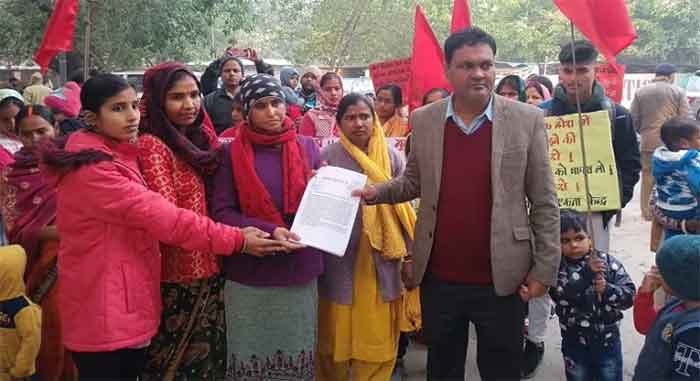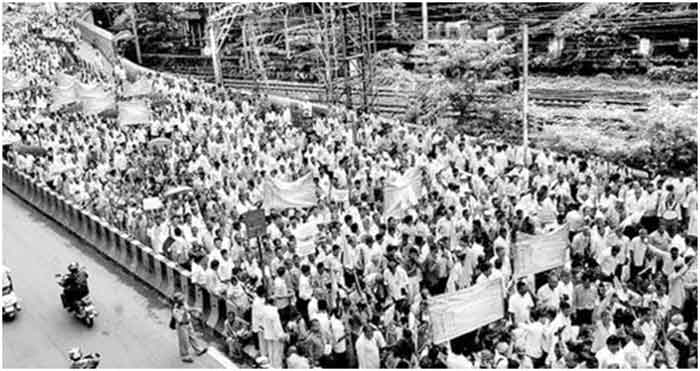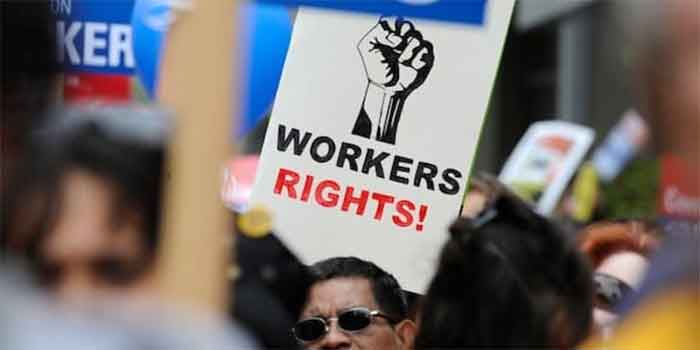
In the first week of August construction workers from several parts of the country organized protests in Delhi and submitted memorandum of their demands to the union government, including the Labor Minister and the Prime Minister.
Although the number of those joining the protest was kept low keeping in view COVID related precautions regarding travel and gatherings, construction workers from North to South were represented with representatives from Jammu and Kashmir and Delhi joining hands with colleagues from Tamil Nadu, Andhra Pradesh and Telengana. The lead organizer was the National Campaign Committee for Central Legislation on Construction Labor ( NCC-CL), an organization which has been in the forefront for the enaction and proper implementation of protective legislation for building and other construction workers ( BOCW) workers for almost four decades.
These efforts and struggles appeared to be well-rewarded when two reasonably good laws for BOCWs were passed in 1996. Although not ideal, these laws went a long way in fulfilling the long pending demands. Briefly these provided for 1% cess to be imposed on all construction work beyond a limit and making available this fund to state BOCW boards ( to be set up in all states and united territories) for providing pensions, health and maternity benefits, educational support for children etc. to construction workers and their families.
However soon a second struggle had to start, this time for the proper implementation of these laws. To their great credit, in these efforts the judiciary of several courts including some high courts and above all the Supreme Court were found to be quite helpful. Gradually 37 state BOCW boards were set up all over the country, and significant benefits strted reaching workers. Although much remained to be done and the actual funds that became available and were used for worker welfare should have been several times higher if everything had gone strictly according to laws, still a good beginning had been made which had brought much hope.
However the recent codification of four labor laws by the union government and assimilating the various existing laws in these four codes has been a big blow for these efforts, the NCC-CL has argued in its recent protests and memorandums. Just when the two important 1996 laws , enacted after a long struggle, were in the process of being stabilized and strengthened, the future of their important provisions has become very uncertain in the process of the recent codification.
Will the already registered workers have to go through another process of re-registeration? What will be the fate of the existing state boards under the new codes? Will the fund vesting with them already for use of welfare of workers be fully protected for this purpose, and will the existing system for constantly adding funds from all new projects be protected? These are the questions which have been bothering construction workers and their representatives and they want clear assurances from the union government. They have also pointed out other apprehensions regarding dilution of some other protections and benefits.
Their stand is very well-reasoned as already achieved gains of workers cannot be rolled back or threatened under the pretext of re-organizing laws, particularly when the re-organization or codifications of laws has taken place without proper consultation with affected workers and in fact all the time ignoring their protests and organizations. All the aspirations which millions of construction workers had from the hard-won existing welfare laws can not be brushed aside in a crual way just by uttering the mantra of codification.
In fact these objections of workers have a wider significance as many other sections of workers ( incidentally including working journalists) are adversely affected by the dilutions of protections relating to boards based systems. Construction work has been regarded as the second most important source of livelihood in the country and any dilution of welfare laws for workers will adversely affect millions of workers. Hence the government should not lose any time in reassuring the workers that there will be no dilution of their protective provisions as made available by the two 1996 laws , and no new new difficulties or hurdles in accessing these protections and benefits will be created, and the directions given by the Supreme Court regarding the proper implementation of these laws will be implemented.
Bharat Dogra is a journalist and author. His recent books include Man Over Machine and Earth Without Borders.















































